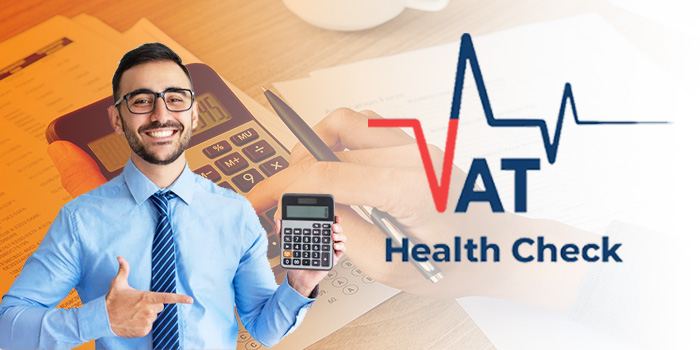An objective assessment of the effectiveness of the VAT procedures, paperwork, and control measures is known as a VAT Health Check. It includes a review of VAT returns, analysis of relevant business transactions, and the maintenance of tax records as required by the law. There need not be a specific reason for the FTA to call for the VAT audit of a company. Therefore it is important to be transparent and precise with the VAT returns and related statutory requirements to avoid non-compliance penalties. TheVAT Health Check in UAE will be carried out in accordance with the procedures and requirements as enlisted by FTA.
How to prepare for VAT Audit?
Following are some key areas that the tax auditors may check to ensure compliance based on their previous experiences –
-
Trial balance and VAT return reconciliation:
The value of taxable supplies are all available to the FTA from the VAT returns submitted for each tax period, which are reliable sources of information. The officer can examine these specifics to determine whether any taxable revenue is not included in the VAT return or whether any input recovery amounts are in excess of the costs that were really incurred. Additionally, it’s possible that some additional revenue was received but was not included in the VAT return or tax filing. Tax auditors can quickly spot discrepancies in the accounts when corporations don’t follow the procedures of periodic closing, limiting back-dated entries, and keeping reconciliation with returns. If these discrepancies are due to reporting errors or are not properly detected and explained to the officer, they may be viewed as taxable supplies.
-
Proof of exporting goods documentation:
According to the rules of the VAT law, goods exported shall be regarded as zero-rated if they are accompanied by official and commercial documentation. Many businesses in the UAE do not currently obtain the requisite export documentation, primarily departure certificates, for the goods shipped. This documentation may not be available for a number of reasons, including exporting in small packages or consolidated exports, not being mandated by customs, not being delivered by the logistic company, and improper document collection. However, the tax authorities might not accept those justifications since they don’t meet the VAT law’s requirement that official documentation includes an export document issued by the customs authority. In a similar circumstance, the officer may request that the taxpayer treat every shipment of goods as a local supply and take into account the tax consequences of that local supply. It is crucial that firms provide correct documentation in order to comply with the zero-rating of exported goods.
-
Examining the tax policies:
The auditors also check to see if there are any discrepancies in the company’s tax treatment practices, such as standard rates reported as zero-rated or exempted, deemed supplies, or related company transactions are not considered taxable supplies, or taxable supplies are thought to be outside of scope, etc. Businesses in sectors with varying VAT rates, such as real estate, healthcare, education, transportation, and electronic services, may need to evaluate the tax laws to ensure compliance.
-
Recovering input costs for personal, entertainment, and vehicle-related expenses:
Taxable individuals who make taxable supplies are qualified to deduct the input associated with the costs of those supplies as long as they have the tax invoice and the payment is made or agreed to be made within six months. The use of a vehicle, a telephone, entertainment, and personal expenses are some restrictions on input recovery. These limitations are based on legal requirements or result from the potential for claiming input as personal expenses. The tax officer will examine the working file for the VAT return filing and the trial balance to identify the expense heads and will examine the supporting documents to determine whether input recovery should be denied.
-
Evidence of payment for expenditures:
One requirement for input recovery is that the taxable person must have paid the taxable expenses or have declared their intention to do so within six months. In order to validate the payment to the supplier, the tax officer may request payment documentation during the audit, such as a supplier-issued receipt voucher or a bank statement entry. Due to a variety of factors, including disagreements, lengthy credit terms, discounts, cash flow issues, etc., firms may occasionally claim input on expenses without paying the supplier. The tax auditor may insist on reversing the VAT input if he discovers a situation in which input VAT is recovered without making the payment or intending to make a payment.
Penalties for non-compliance with VAT law
In the UAE, a VAT audit is more of a thorough and all-encompassing task taken by the authority to monitor the registrants’ tax compliance and protect the federal government’s revenue sources.
Non-compliance with the relevant laws and regulations issued by the Ministry is accompanied by hefty penalties.
| The failure of the Taxable Person to submit a registration application within the timeframe | AED 10,000 |
| The Failure to maintain required records | AED 10,000 for the first time and AED 20,000 in case of repetition. |
| The failure of the Registrant to submit theTax Return within the time frame | AED 1,000 for the first time.
AED 2,000 in case of repetition within 24 months |
| The submittal of an incorrect Tax Return | Fixed penalty : AED 1,000 for the first time.
AED 2,000 in case ofrepetition. |
| The failure of the Taxable Person to comply with the conditions and procedures regarding the issuance of a Tax Invoice and a Tax Credit Note electronically. | AED 2,500 for each detected case. |
Why should you use Elevate First Accounting and Auditing with VAT health check in UAE?
Our comprehensive and all-encompassing VAT health check service examines every facet of how your business manages its VAT duties and identifies doable next steps you can take to remedy any potential difficulties. As a one of the best VAT consultants UAE, we willl helping you in the following ways to get your VAT health check done:
– Examine your internal accounting records, supporting materials, VAT records, etc.
– Review your submitted returns to see any places where you are consistently making mistakes.
– Verify that the figures returned in accordance with the VAT documents correspond to the financial records.
– Examine whether you are utilizing the VAT regulations to obtain the appropriate credits or refunds for your company and whether such claims are made in the returns.
– Determine the areas in which you can make proper VAT planning.
– Examining the upkeep of your VAT files’ audit trails, finances, and records.
– Finding opportunities or areas of concern.
– Verify that all VAT returns related to your business income and permitted costs are filed accurately and appropriately.
– Verify that all of your registration documents comply with FTA criteria and that they are all updated or renewed on time.
– VAT Health Check assists in choosing the VAT accounting strategy that is most appropriate for your type of business.

